BTEC HNC Unit 9: Entrepreneurship and Small Business Management Report
VerifiedAdded on 2023/01/12
|12
|4341
|53
Report
AI Summary
This report analyzes entrepreneurship and small business management, focusing on various types of entrepreneurial ventures, including small, scalable, large, and social enterprises. It explores the similarities and dissimilarities between these ventures, using the Coca-Cola company as a case study. The report assesses the impact of micro and small businesses on the economy by interpreting relevant data and statistics. It further examines the importance of small and start-up businesses in the growth of the social economy. The report also analyzes the characteristic traits and skills of successful entrepreneurs, differentiating them from business managers, and assesses entrepreneurial personality traits and mindsets. Finally, it investigates the influence of entrepreneurs' backgrounds and experiences on private enterprise, providing a comprehensive overview of entrepreneurship principles and practices.
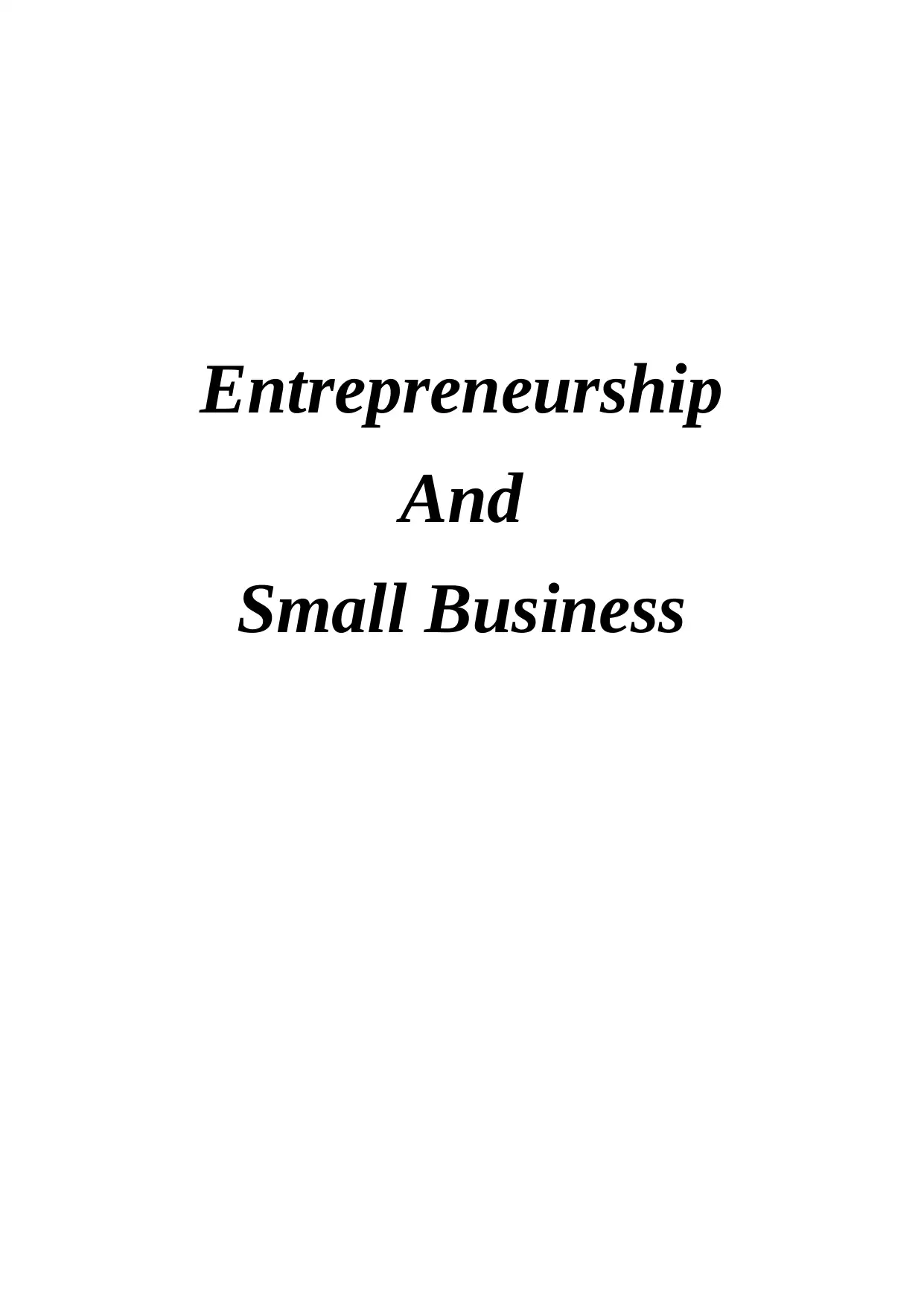
Entrepreneurship
And
Small Business
And
Small Business
Paraphrase This Document
Need a fresh take? Get an instant paraphrase of this document with our AI Paraphraser
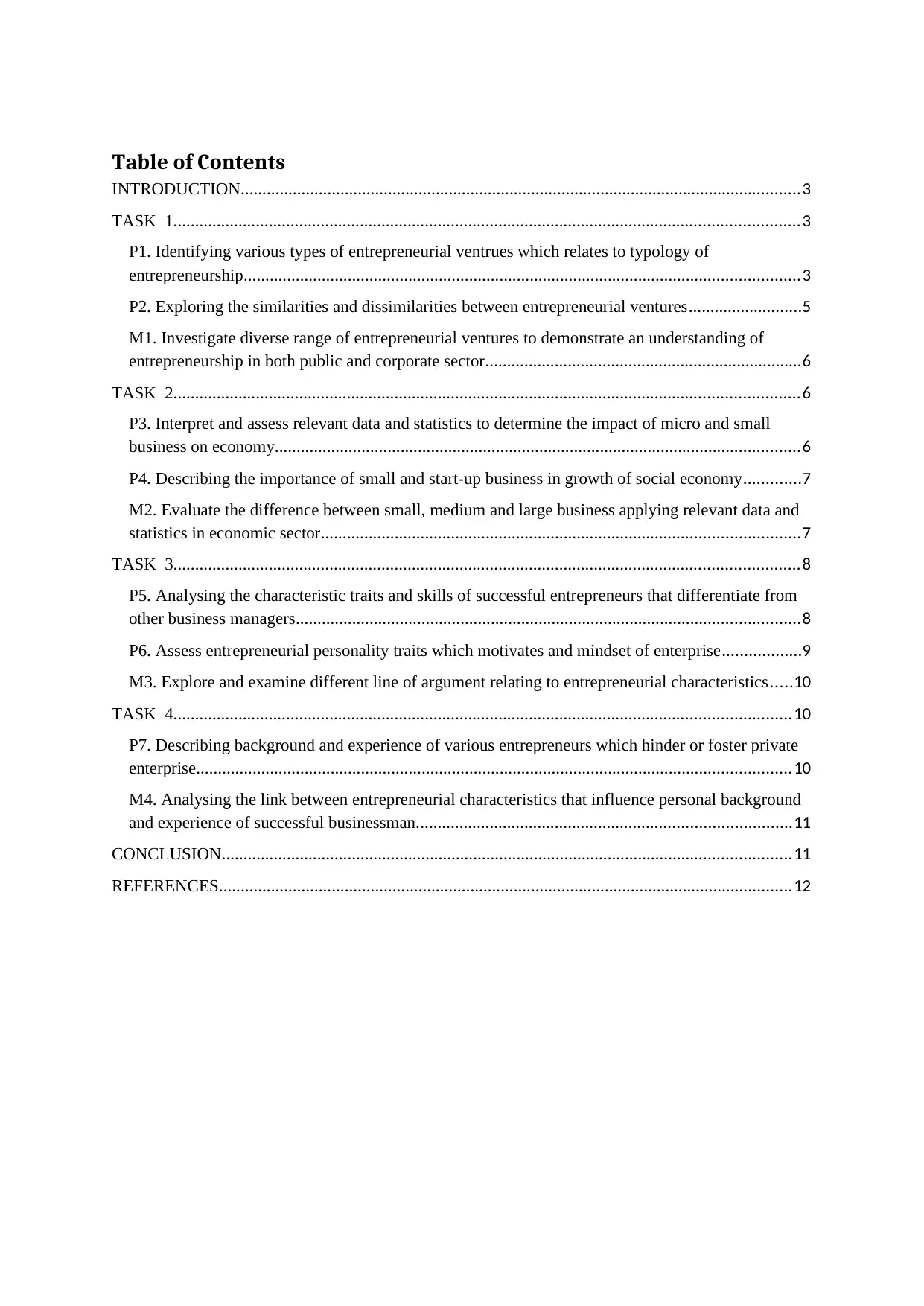
Table of Contents
INTRODUCTION.................................................................................................................................3
TASK 1................................................................................................................................................3
P1. Identifying various types of entrepreneurial ventrues which relates to typology of
entrepreneurship................................................................................................................................3
P2. Exploring the similarities and dissimilarities between entrepreneurial ventures..........................5
M1. Investigate diverse range of entrepreneurial ventures to demonstrate an understanding of
entrepreneurship in both public and corporate sector.........................................................................6
TASK 2................................................................................................................................................6
P3. Interpret and assess relevant data and statistics to determine the impact of micro and small
business on economy.........................................................................................................................6
P4. Describing the importance of small and start-up business in growth of social economy.............7
M2. Evaluate the difference between small, medium and large business applying relevant data and
statistics in economic sector..............................................................................................................7
TASK 3................................................................................................................................................8
P5. Analysing the characteristic traits and skills of successful entrepreneurs that differentiate from
other business managers....................................................................................................................8
P6. Assess entrepreneurial personality traits which motivates and mindset of enterprise..................9
M3. Explore and examine different line of argument relating to entrepreneurial characteristics.....10
TASK 4..............................................................................................................................................10
P7. Describing background and experience of various entrepreneurs which hinder or foster private
enterprise.........................................................................................................................................10
M4. Analysing the link between entrepreneurial characteristics that influence personal background
and experience of successful businessman......................................................................................11
CONCLUSION...................................................................................................................................11
REFERENCES....................................................................................................................................12
INTRODUCTION.................................................................................................................................3
TASK 1................................................................................................................................................3
P1. Identifying various types of entrepreneurial ventrues which relates to typology of
entrepreneurship................................................................................................................................3
P2. Exploring the similarities and dissimilarities between entrepreneurial ventures..........................5
M1. Investigate diverse range of entrepreneurial ventures to demonstrate an understanding of
entrepreneurship in both public and corporate sector.........................................................................6
TASK 2................................................................................................................................................6
P3. Interpret and assess relevant data and statistics to determine the impact of micro and small
business on economy.........................................................................................................................6
P4. Describing the importance of small and start-up business in growth of social economy.............7
M2. Evaluate the difference between small, medium and large business applying relevant data and
statistics in economic sector..............................................................................................................7
TASK 3................................................................................................................................................8
P5. Analysing the characteristic traits and skills of successful entrepreneurs that differentiate from
other business managers....................................................................................................................8
P6. Assess entrepreneurial personality traits which motivates and mindset of enterprise..................9
M3. Explore and examine different line of argument relating to entrepreneurial characteristics.....10
TASK 4..............................................................................................................................................10
P7. Describing background and experience of various entrepreneurs which hinder or foster private
enterprise.........................................................................................................................................10
M4. Analysing the link between entrepreneurial characteristics that influence personal background
and experience of successful businessman......................................................................................11
CONCLUSION...................................................................................................................................11
REFERENCES....................................................................................................................................12
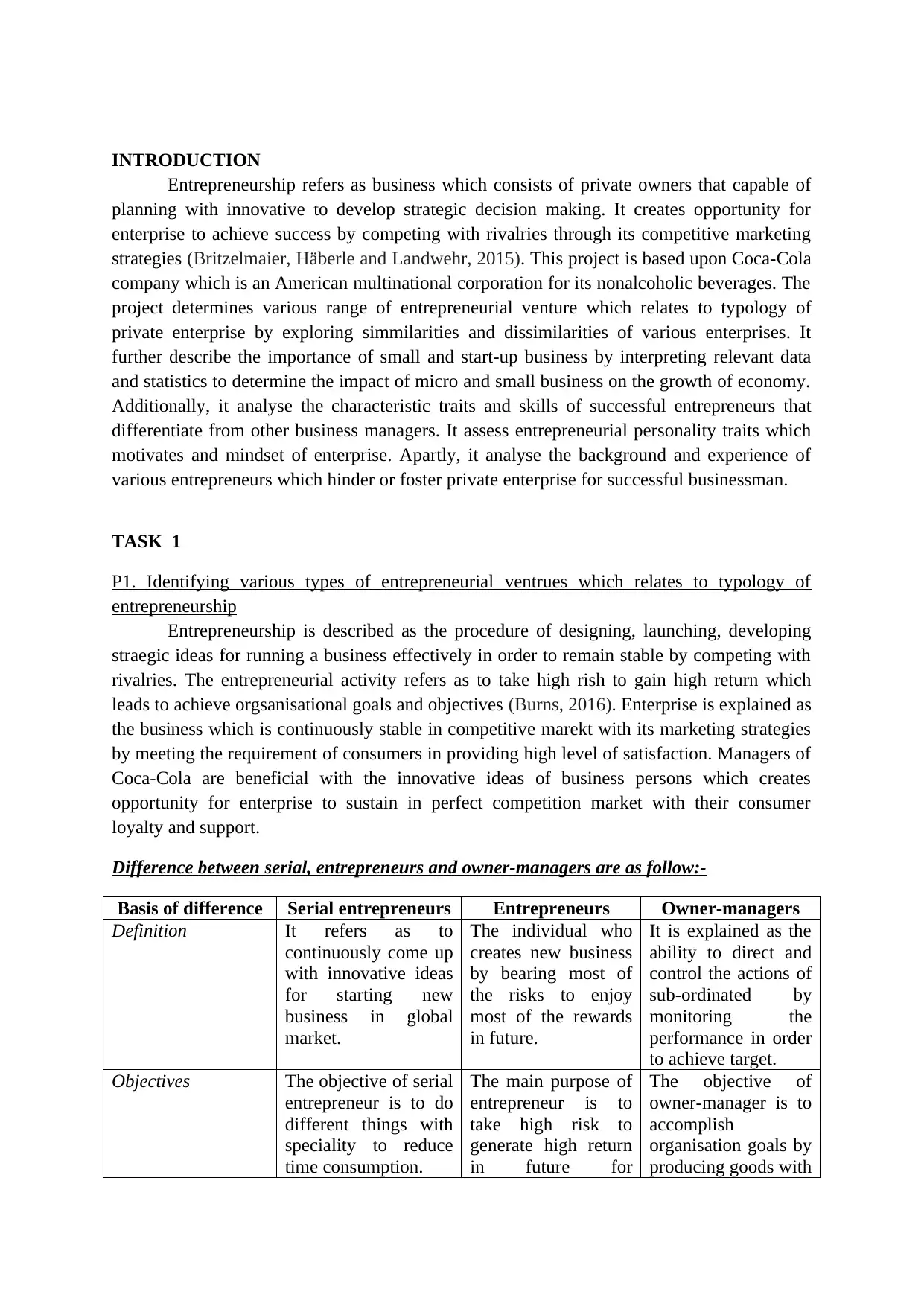
INTRODUCTION
Entrepreneurship refers as business which consists of private owners that capable of
planning with innovative to develop strategic decision making. It creates opportunity for
enterprise to achieve success by competing with rivalries through its competitive marketing
strategies (Britzelmaier, Häberle and Landwehr, 2015). This project is based upon Coca-Cola
company which is an American multinational corporation for its nonalcoholic beverages. The
project determines various range of entrepreneurial venture which relates to typology of
private enterprise by exploring simmilarities and dissimilarities of various enterprises. It
further describe the importance of small and start-up business by interpreting relevant data
and statistics to determine the impact of micro and small business on the growth of economy.
Additionally, it analyse the characteristic traits and skills of successful entrepreneurs that
differentiate from other business managers. It assess entrepreneurial personality traits which
motivates and mindset of enterprise. Apartly, it analyse the background and experience of
various entrepreneurs which hinder or foster private enterprise for successful businessman.
TASK 1
P1. Identifying various types of entrepreneurial ventrues which relates to typology of
entrepreneurship
Entrepreneurship is described as the procedure of designing, launching, developing
straegic ideas for running a business effectively in order to remain stable by competing with
rivalries. The entrepreneurial activity refers as to take high rish to gain high return which
leads to achieve orgsanisational goals and objectives (Burns, 2016). Enterprise is explained as
the business which is continuously stable in competitive marekt with its marketing strategies
by meeting the requirement of consumers in providing high level of satisfaction. Managers of
Coca-Cola are beneficial with the innovative ideas of business persons which creates
opportunity for enterprise to sustain in perfect competition market with their consumer
loyalty and support.
Difference between serial, entrepreneurs and owner-managers are as follow:-
Basis of difference Serial entrepreneurs Entrepreneurs Owner-managers
Definition It refers as to
continuously come up
with innovative ideas
for starting new
business in global
market.
The individual who
creates new business
by bearing most of
the risks to enjoy
most of the rewards
in future.
It is explained as the
ability to direct and
control the actions of
sub-ordinated by
monitoring the
performance in order
to achieve target.
Objectives The objective of serial
entrepreneur is to do
different things with
speciality to reduce
time consumption.
The main purpose of
entrepreneur is to
take high risk to
generate high return
in future for
The objective of
owner-manager is to
accomplish
organisation goals by
producing goods with
Entrepreneurship refers as business which consists of private owners that capable of
planning with innovative to develop strategic decision making. It creates opportunity for
enterprise to achieve success by competing with rivalries through its competitive marketing
strategies (Britzelmaier, Häberle and Landwehr, 2015). This project is based upon Coca-Cola
company which is an American multinational corporation for its nonalcoholic beverages. The
project determines various range of entrepreneurial venture which relates to typology of
private enterprise by exploring simmilarities and dissimilarities of various enterprises. It
further describe the importance of small and start-up business by interpreting relevant data
and statistics to determine the impact of micro and small business on the growth of economy.
Additionally, it analyse the characteristic traits and skills of successful entrepreneurs that
differentiate from other business managers. It assess entrepreneurial personality traits which
motivates and mindset of enterprise. Apartly, it analyse the background and experience of
various entrepreneurs which hinder or foster private enterprise for successful businessman.
TASK 1
P1. Identifying various types of entrepreneurial ventrues which relates to typology of
entrepreneurship
Entrepreneurship is described as the procedure of designing, launching, developing
straegic ideas for running a business effectively in order to remain stable by competing with
rivalries. The entrepreneurial activity refers as to take high rish to gain high return which
leads to achieve orgsanisational goals and objectives (Burns, 2016). Enterprise is explained as
the business which is continuously stable in competitive marekt with its marketing strategies
by meeting the requirement of consumers in providing high level of satisfaction. Managers of
Coca-Cola are beneficial with the innovative ideas of business persons which creates
opportunity for enterprise to sustain in perfect competition market with their consumer
loyalty and support.
Difference between serial, entrepreneurs and owner-managers are as follow:-
Basis of difference Serial entrepreneurs Entrepreneurs Owner-managers
Definition It refers as to
continuously come up
with innovative ideas
for starting new
business in global
market.
The individual who
creates new business
by bearing most of
the risks to enjoy
most of the rewards
in future.
It is explained as the
ability to direct and
control the actions of
sub-ordinated by
monitoring the
performance in order
to achieve target.
Objectives The objective of serial
entrepreneur is to do
different things with
speciality to reduce
time consumption.
The main purpose of
entrepreneur is to
take high risk to
generate high return
in future for
The objective of
owner-manager is to
accomplish
organisation goals by
producing goods with
⊘ This is a preview!⊘
Do you want full access?
Subscribe today to unlock all pages.

Trusted by 1+ million students worldwide
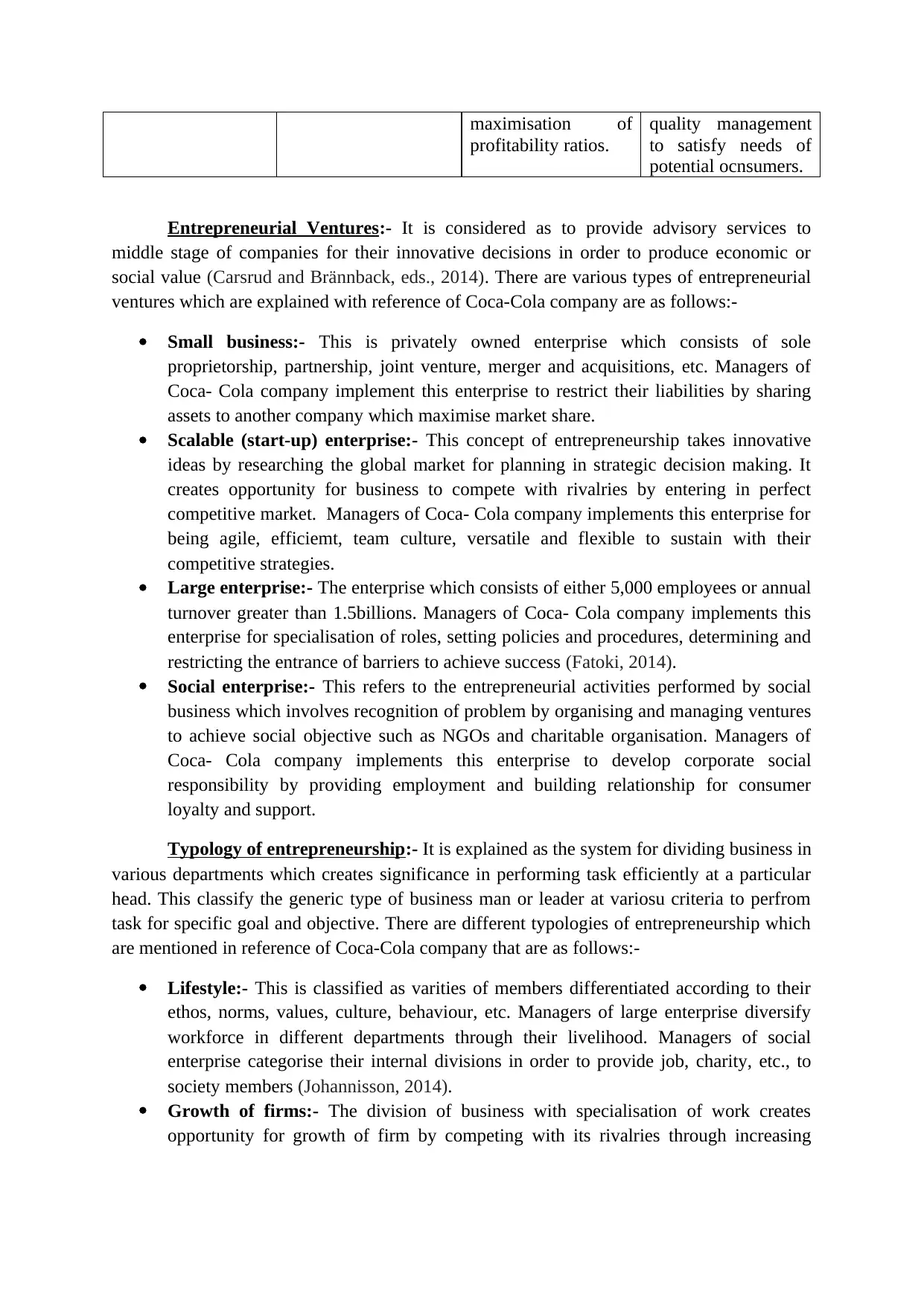
maximisation of
profitability ratios.
quality management
to satisfy needs of
potential ocnsumers.
Entrepreneurial Ventures:- It is considered as to provide advisory services to
middle stage of companies for their innovative decisions in order to produce economic or
social value (Carsrud and Brännback, eds., 2014). There are various types of entrepreneurial
ventures which are explained with reference of Coca-Cola company are as follows:-
Small business:- This is privately owned enterprise which consists of sole
proprietorship, partnership, joint venture, merger and acquisitions, etc. Managers of
Coca- Cola company implement this enterprise to restrict their liabilities by sharing
assets to another company which maximise market share.
Scalable (start-up) enterprise:- This concept of entrepreneurship takes innovative
ideas by researching the global market for planning in strategic decision making. It
creates opportunity for business to compete with rivalries by entering in perfect
competitive market. Managers of Coca- Cola company implements this enterprise for
being agile, efficiemt, team culture, versatile and flexible to sustain with their
competitive strategies.
Large enterprise:- The enterprise which consists of either 5,000 employees or annual
turnover greater than 1.5billions. Managers of Coca- Cola company implements this
enterprise for specialisation of roles, setting policies and procedures, determining and
restricting the entrance of barriers to achieve success (Fatoki, 2014).
Social enterprise:- This refers to the entrepreneurial activities performed by social
business which involves recognition of problem by organising and managing ventures
to achieve social objective such as NGOs and charitable organisation. Managers of
Coca- Cola company implements this enterprise to develop corporate social
responsibility by providing employment and building relationship for consumer
loyalty and support.
Typology of entrepreneurship:- It is explained as the system for dividing business in
various departments which creates significance in performing task efficiently at a particular
head. This classify the generic type of business man or leader at variosu criteria to perfrom
task for specific goal and objective. There are different typologies of entrepreneurship which
are mentioned in reference of Coca-Cola company that are as follows:-
Lifestyle:- This is classified as varities of members differentiated according to their
ethos, norms, values, culture, behaviour, etc. Managers of large enterprise diversify
workforce in different departments through their livelihood. Managers of social
enterprise categorise their internal divisions in order to provide job, charity, etc., to
society members (Johannisson, 2014).
Growth of firms:- The division of business with specialisation of work creates
opportunity for growth of firm by competing with its rivalries through increasing
profitability ratios.
quality management
to satisfy needs of
potential ocnsumers.
Entrepreneurial Ventures:- It is considered as to provide advisory services to
middle stage of companies for their innovative decisions in order to produce economic or
social value (Carsrud and Brännback, eds., 2014). There are various types of entrepreneurial
ventures which are explained with reference of Coca-Cola company are as follows:-
Small business:- This is privately owned enterprise which consists of sole
proprietorship, partnership, joint venture, merger and acquisitions, etc. Managers of
Coca- Cola company implement this enterprise to restrict their liabilities by sharing
assets to another company which maximise market share.
Scalable (start-up) enterprise:- This concept of entrepreneurship takes innovative
ideas by researching the global market for planning in strategic decision making. It
creates opportunity for business to compete with rivalries by entering in perfect
competitive market. Managers of Coca- Cola company implements this enterprise for
being agile, efficiemt, team culture, versatile and flexible to sustain with their
competitive strategies.
Large enterprise:- The enterprise which consists of either 5,000 employees or annual
turnover greater than 1.5billions. Managers of Coca- Cola company implements this
enterprise for specialisation of roles, setting policies and procedures, determining and
restricting the entrance of barriers to achieve success (Fatoki, 2014).
Social enterprise:- This refers to the entrepreneurial activities performed by social
business which involves recognition of problem by organising and managing ventures
to achieve social objective such as NGOs and charitable organisation. Managers of
Coca- Cola company implements this enterprise to develop corporate social
responsibility by providing employment and building relationship for consumer
loyalty and support.
Typology of entrepreneurship:- It is explained as the system for dividing business in
various departments which creates significance in performing task efficiently at a particular
head. This classify the generic type of business man or leader at variosu criteria to perfrom
task for specific goal and objective. There are different typologies of entrepreneurship which
are mentioned in reference of Coca-Cola company that are as follows:-
Lifestyle:- This is classified as varities of members differentiated according to their
ethos, norms, values, culture, behaviour, etc. Managers of large enterprise diversify
workforce in different departments through their livelihood. Managers of social
enterprise categorise their internal divisions in order to provide job, charity, etc., to
society members (Johannisson, 2014).
Growth of firms:- The division of business with specialisation of work creates
opportunity for growth of firm by competing with its rivalries through increasing
Paraphrase This Document
Need a fresh take? Get an instant paraphrase of this document with our AI Paraphraser
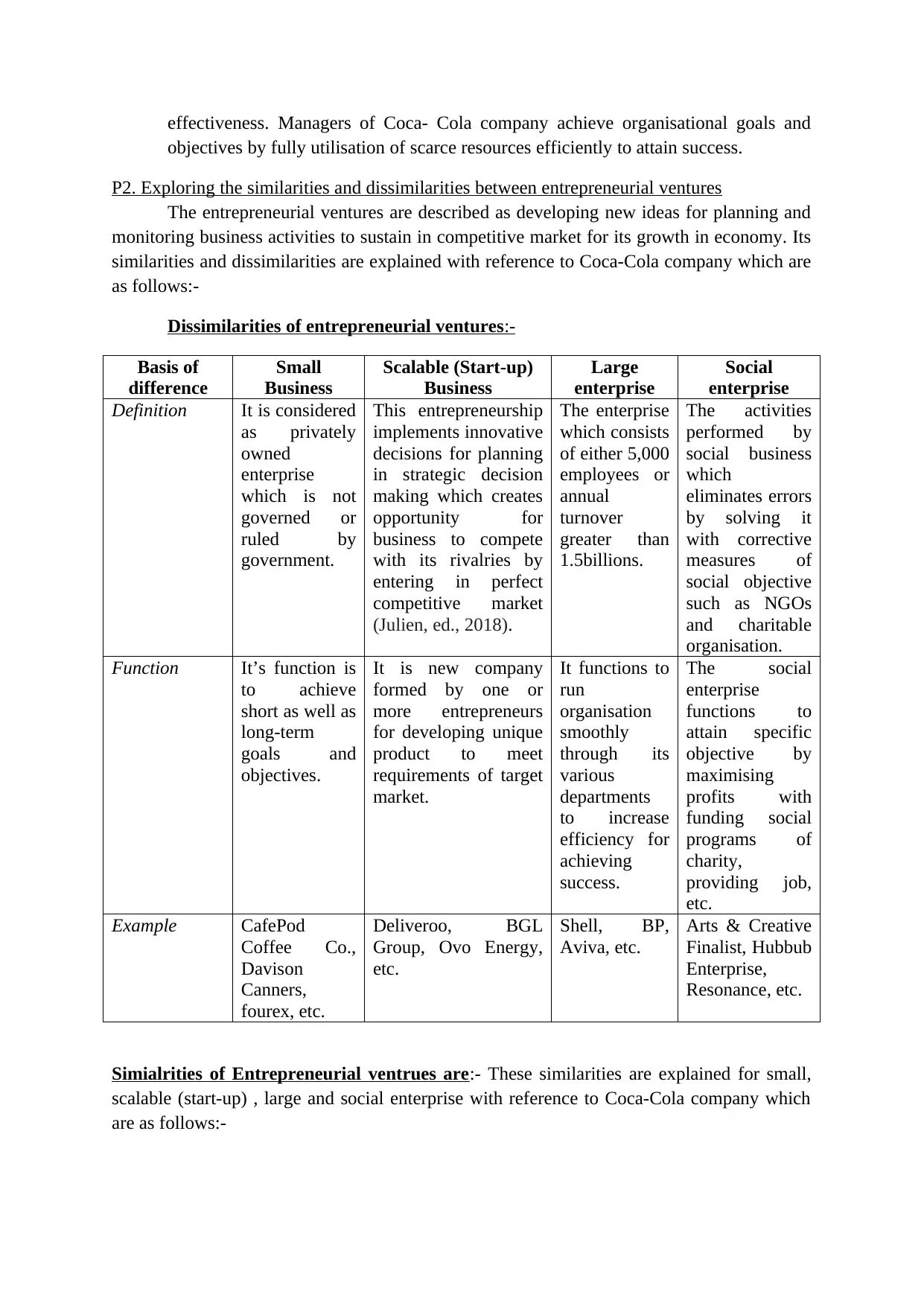
effectiveness. Managers of Coca- Cola company achieve organisational goals and
objectives by fully utilisation of scarce resources efficiently to attain success.
P2. Exploring the similarities and dissimilarities between entrepreneurial ventures
The entrepreneurial ventures are described as developing new ideas for planning and
monitoring business activities to sustain in competitive market for its growth in economy. Its
similarities and dissimilarities are explained with reference to Coca-Cola company which are
as follows:-
Dissimilarities of entrepreneurial ventures:-
Basis of
difference
Small
Business
Scalable (Start-up)
Business
Large
enterprise
Social
enterprise
Definition It is considered
as privately
owned
enterprise
which is not
governed or
ruled by
government.
This entrepreneurship
implements innovative
decisions for planning
in strategic decision
making which creates
opportunity for
business to compete
with its rivalries by
entering in perfect
competitive market
(Julien, ed., 2018).
The enterprise
which consists
of either 5,000
employees or
annual
turnover
greater than
1.5billions.
The activities
performed by
social business
which
eliminates errors
by solving it
with corrective
measures of
social objective
such as NGOs
and charitable
organisation.
Function It’s function is
to achieve
short as well as
long-term
goals and
objectives.
It is new company
formed by one or
more entrepreneurs
for developing unique
product to meet
requirements of target
market.
It functions to
run
organisation
smoothly
through its
various
departments
to increase
efficiency for
achieving
success.
The social
enterprise
functions to
attain specific
objective by
maximising
profits with
funding social
programs of
charity,
providing job,
etc.
Example CafePod
Coffee Co.,
Davison
Canners,
fourex, etc.
Deliveroo, BGL
Group, Ovo Energy,
etc.
Shell, BP,
Aviva, etc.
Arts & Creative
Finalist, Hubbub
Enterprise,
Resonance, etc.
Simialrities of Entrepreneurial ventrues are:- These similarities are explained for small,
scalable (start-up) , large and social enterprise with reference to Coca-Cola company which
are as follows:-
objectives by fully utilisation of scarce resources efficiently to attain success.
P2. Exploring the similarities and dissimilarities between entrepreneurial ventures
The entrepreneurial ventures are described as developing new ideas for planning and
monitoring business activities to sustain in competitive market for its growth in economy. Its
similarities and dissimilarities are explained with reference to Coca-Cola company which are
as follows:-
Dissimilarities of entrepreneurial ventures:-
Basis of
difference
Small
Business
Scalable (Start-up)
Business
Large
enterprise
Social
enterprise
Definition It is considered
as privately
owned
enterprise
which is not
governed or
ruled by
government.
This entrepreneurship
implements innovative
decisions for planning
in strategic decision
making which creates
opportunity for
business to compete
with its rivalries by
entering in perfect
competitive market
(Julien, ed., 2018).
The enterprise
which consists
of either 5,000
employees or
annual
turnover
greater than
1.5billions.
The activities
performed by
social business
which
eliminates errors
by solving it
with corrective
measures of
social objective
such as NGOs
and charitable
organisation.
Function It’s function is
to achieve
short as well as
long-term
goals and
objectives.
It is new company
formed by one or
more entrepreneurs
for developing unique
product to meet
requirements of target
market.
It functions to
run
organisation
smoothly
through its
various
departments
to increase
efficiency for
achieving
success.
The social
enterprise
functions to
attain specific
objective by
maximising
profits with
funding social
programs of
charity,
providing job,
etc.
Example CafePod
Coffee Co.,
Davison
Canners,
fourex, etc.
Deliveroo, BGL
Group, Ovo Energy,
etc.
Shell, BP,
Aviva, etc.
Arts & Creative
Finalist, Hubbub
Enterprise,
Resonance, etc.
Simialrities of Entrepreneurial ventrues are:- These similarities are explained for small,
scalable (start-up) , large and social enterprise with reference to Coca-Cola company which
are as follows:-
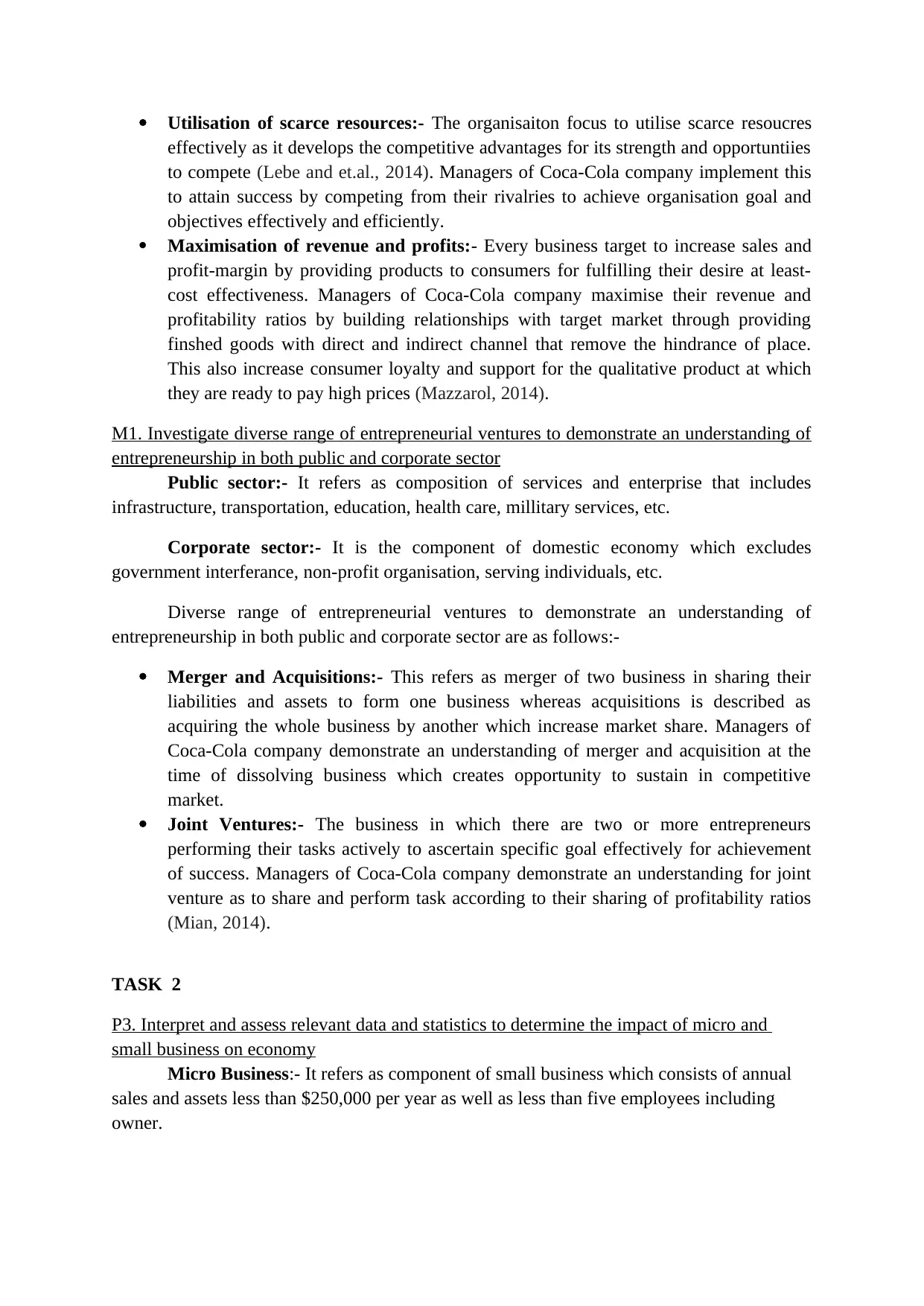
Utilisation of scarce resources:- The organisaiton focus to utilise scarce resoucres
effectively as it develops the competitive advantages for its strength and opportuntiies
to compete (Lebe and et.al., 2014). Managers of Coca-Cola company implement this
to attain success by competing from their rivalries to achieve organisation goal and
objectives effectively and efficiently.
Maximisation of revenue and profits:- Every business target to increase sales and
profit-margin by providing products to consumers for fulfilling their desire at least-
cost effectiveness. Managers of Coca-Cola company maximise their revenue and
profitability ratios by building relationships with target market through providing
finshed goods with direct and indirect channel that remove the hindrance of place.
This also increase consumer loyalty and support for the qualitative product at which
they are ready to pay high prices (Mazzarol, 2014).
M1. Investigate diverse range of entrepreneurial ventures to demonstrate an understanding of
entrepreneurship in both public and corporate sector
Public sector:- It refers as composition of services and enterprise that includes
infrastructure, transportation, education, health care, millitary services, etc.
Corporate sector:- It is the component of domestic economy which excludes
government interferance, non-profit organisation, serving individuals, etc.
Diverse range of entrepreneurial ventures to demonstrate an understanding of
entrepreneurship in both public and corporate sector are as follows:-
Merger and Acquisitions:- This refers as merger of two business in sharing their
liabilities and assets to form one business whereas acquisitions is described as
acquiring the whole business by another which increase market share. Managers of
Coca-Cola company demonstrate an understanding of merger and acquisition at the
time of dissolving business which creates opportunity to sustain in competitive
market.
Joint Ventures:- The business in which there are two or more entrepreneurs
performing their tasks actively to ascertain specific goal effectively for achievement
of success. Managers of Coca-Cola company demonstrate an understanding for joint
venture as to share and perform task according to their sharing of profitability ratios
(Mian, 2014).
TASK 2
P3. Interpret and assess relevant data and statistics to determine the impact of micro and
small business on economy
Micro Business:- It refers as component of small business which consists of annual
sales and assets less than $250,000 per year as well as less than five employees including
owner.
effectively as it develops the competitive advantages for its strength and opportuntiies
to compete (Lebe and et.al., 2014). Managers of Coca-Cola company implement this
to attain success by competing from their rivalries to achieve organisation goal and
objectives effectively and efficiently.
Maximisation of revenue and profits:- Every business target to increase sales and
profit-margin by providing products to consumers for fulfilling their desire at least-
cost effectiveness. Managers of Coca-Cola company maximise their revenue and
profitability ratios by building relationships with target market through providing
finshed goods with direct and indirect channel that remove the hindrance of place.
This also increase consumer loyalty and support for the qualitative product at which
they are ready to pay high prices (Mazzarol, 2014).
M1. Investigate diverse range of entrepreneurial ventures to demonstrate an understanding of
entrepreneurship in both public and corporate sector
Public sector:- It refers as composition of services and enterprise that includes
infrastructure, transportation, education, health care, millitary services, etc.
Corporate sector:- It is the component of domestic economy which excludes
government interferance, non-profit organisation, serving individuals, etc.
Diverse range of entrepreneurial ventures to demonstrate an understanding of
entrepreneurship in both public and corporate sector are as follows:-
Merger and Acquisitions:- This refers as merger of two business in sharing their
liabilities and assets to form one business whereas acquisitions is described as
acquiring the whole business by another which increase market share. Managers of
Coca-Cola company demonstrate an understanding of merger and acquisition at the
time of dissolving business which creates opportunity to sustain in competitive
market.
Joint Ventures:- The business in which there are two or more entrepreneurs
performing their tasks actively to ascertain specific goal effectively for achievement
of success. Managers of Coca-Cola company demonstrate an understanding for joint
venture as to share and perform task according to their sharing of profitability ratios
(Mian, 2014).
TASK 2
P3. Interpret and assess relevant data and statistics to determine the impact of micro and
small business on economy
Micro Business:- It refers as component of small business which consists of annual
sales and assets less than $250,000 per year as well as less than five employees including
owner.
⊘ This is a preview!⊘
Do you want full access?
Subscribe today to unlock all pages.

Trusted by 1+ million students worldwide
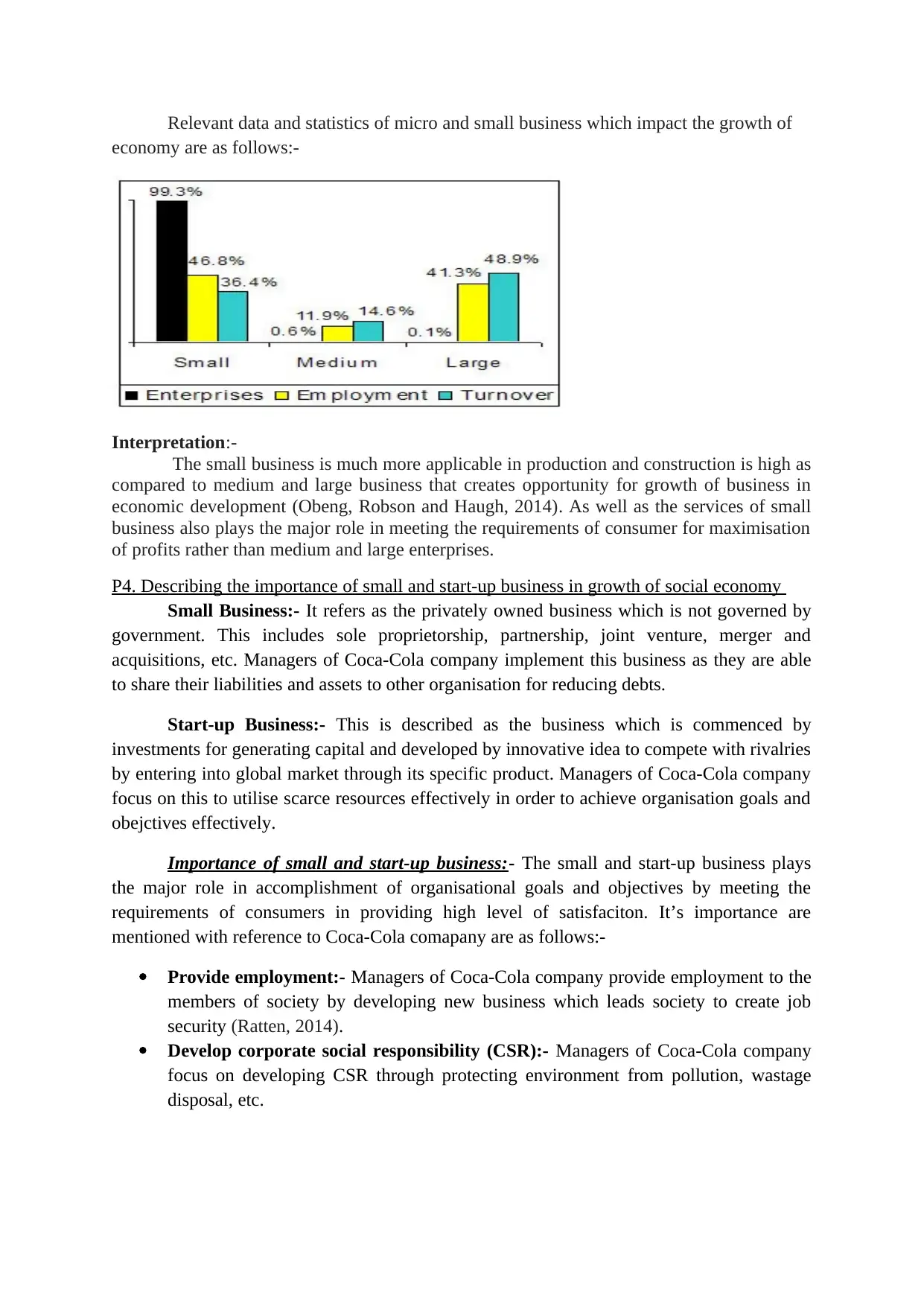
Relevant data and statistics of micro and small business which impact the growth of
economy are as follows:-
Interpretation:-
The small business is much more applicable in production and construction is high as
compared to medium and large business that creates opportunity for growth of business in
economic development (Obeng, Robson and Haugh, 2014). As well as the services of small
business also plays the major role in meeting the requirements of consumer for maximisation
of profits rather than medium and large enterprises.
P4. Describing the importance of small and start-up business in growth of social economy
Small Business:- It refers as the privately owned business which is not governed by
government. This includes sole proprietorship, partnership, joint venture, merger and
acquisitions, etc. Managers of Coca-Cola company implement this business as they are able
to share their liabilities and assets to other organisation for reducing debts.
Start-up Business:- This is described as the business which is commenced by
investments for generating capital and developed by innovative idea to compete with rivalries
by entering into global market through its specific product. Managers of Coca-Cola company
focus on this to utilise scarce resources effectively in order to achieve organisation goals and
obejctives effectively.
Importance of small and start-up business:- The small and start-up business plays
the major role in accomplishment of organisational goals and objectives by meeting the
requirements of consumers in providing high level of satisfaciton. It’s importance are
mentioned with reference to Coca-Cola comapany are as follows:-
Provide employment:- Managers of Coca-Cola company provide employment to the
members of society by developing new business which leads society to create job
security (Ratten, 2014).
Develop corporate social responsibility (CSR):- Managers of Coca-Cola company
focus on developing CSR through protecting environment from pollution, wastage
disposal, etc.
economy are as follows:-
Interpretation:-
The small business is much more applicable in production and construction is high as
compared to medium and large business that creates opportunity for growth of business in
economic development (Obeng, Robson and Haugh, 2014). As well as the services of small
business also plays the major role in meeting the requirements of consumer for maximisation
of profits rather than medium and large enterprises.
P4. Describing the importance of small and start-up business in growth of social economy
Small Business:- It refers as the privately owned business which is not governed by
government. This includes sole proprietorship, partnership, joint venture, merger and
acquisitions, etc. Managers of Coca-Cola company implement this business as they are able
to share their liabilities and assets to other organisation for reducing debts.
Start-up Business:- This is described as the business which is commenced by
investments for generating capital and developed by innovative idea to compete with rivalries
by entering into global market through its specific product. Managers of Coca-Cola company
focus on this to utilise scarce resources effectively in order to achieve organisation goals and
obejctives effectively.
Importance of small and start-up business:- The small and start-up business plays
the major role in accomplishment of organisational goals and objectives by meeting the
requirements of consumers in providing high level of satisfaciton. It’s importance are
mentioned with reference to Coca-Cola comapany are as follows:-
Provide employment:- Managers of Coca-Cola company provide employment to the
members of society by developing new business which leads society to create job
security (Ratten, 2014).
Develop corporate social responsibility (CSR):- Managers of Coca-Cola company
focus on developing CSR through protecting environment from pollution, wastage
disposal, etc.
Paraphrase This Document
Need a fresh take? Get an instant paraphrase of this document with our AI Paraphraser
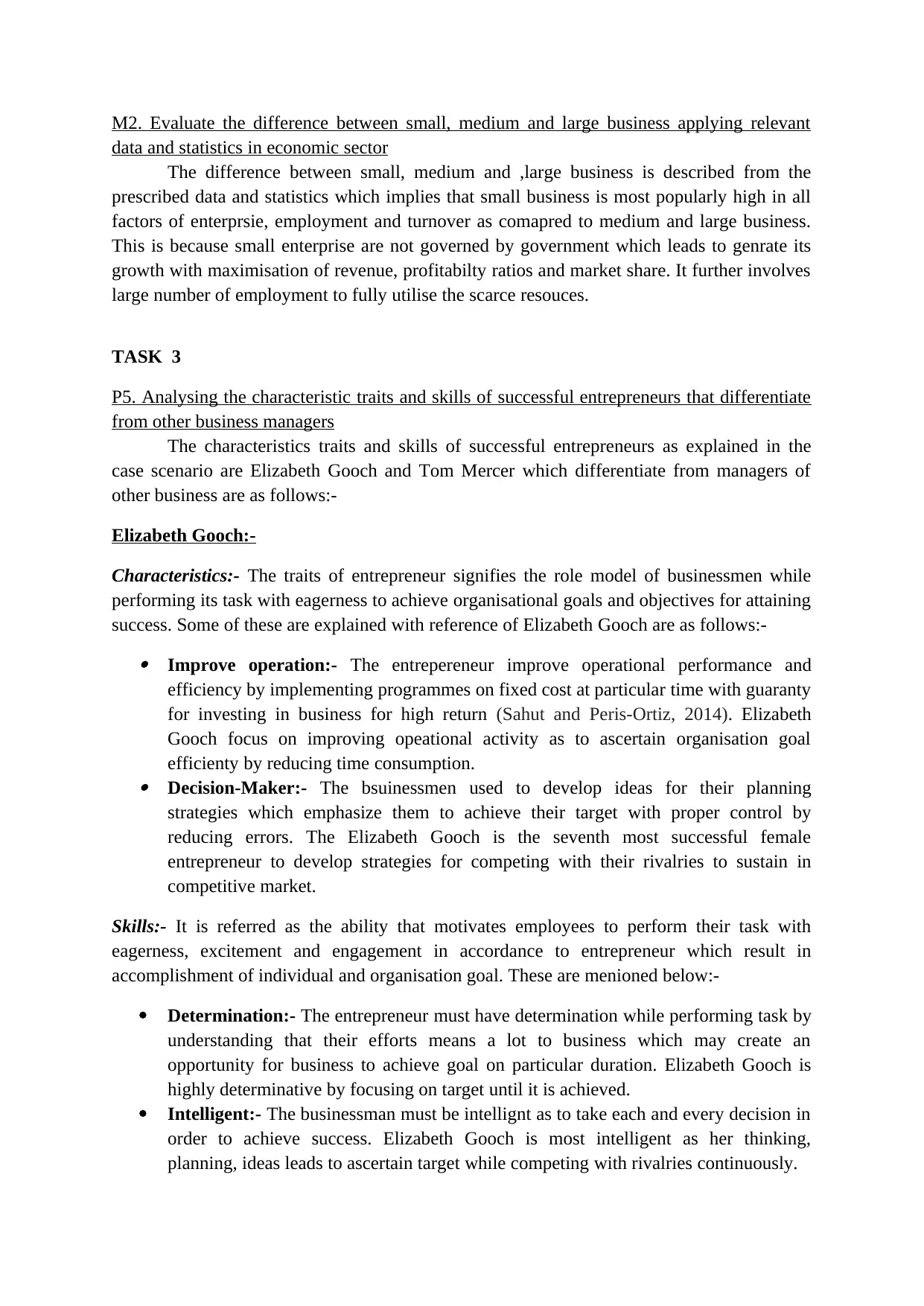
M2. Evaluate the difference between small, medium and large business applying relevant
data and statistics in economic sector
The difference between small, medium and ,large business is described from the
prescribed data and statistics which implies that small business is most popularly high in all
factors of enterprsie, employment and turnover as comapred to medium and large business.
This is because small enterprise are not governed by government which leads to genrate its
growth with maximisation of revenue, profitabilty ratios and market share. It further involves
large number of employment to fully utilise the scarce resouces.
TASK 3
P5. Analysing the characteristic traits and skills of successful entrepreneurs that differentiate
from other business managers
The characteristics traits and skills of successful entrepreneurs as explained in the
case scenario are Elizabeth Gooch and Tom Mercer which differentiate from managers of
other business are as follows:-
Elizabeth Gooch:-
Characteristics:- The traits of entrepreneur signifies the role model of businessmen while
performing its task with eagerness to achieve organisational goals and objectives for attaining
success. Some of these are explained with reference of Elizabeth Gooch are as follows:- Improve operation:- The entrepereneur improve operational performance and
efficiency by implementing programmes on fixed cost at particular time with guaranty
for investing in business for high return (Sahut and Peris-Ortiz, 2014). Elizabeth
Gooch focus on improving opeational activity as to ascertain organisation goal
efficienty by reducing time consumption.
Decision-Maker:- The bsuinessmen used to develop ideas for their planning
strategies which emphasize them to achieve their target with proper control by
reducing errors. The Elizabeth Gooch is the seventh most successful female
entrepreneur to develop strategies for competing with their rivalries to sustain in
competitive market.
Skills:- It is referred as the ability that motivates employees to perform their task with
eagerness, excitement and engagement in accordance to entrepreneur which result in
accomplishment of individual and organisation goal. These are menioned below:-
Determination:- The entrepreneur must have determination while performing task by
understanding that their efforts means a lot to business which may create an
opportunity for business to achieve goal on particular duration. Elizabeth Gooch is
highly determinative by focusing on target until it is achieved.
Intelligent:- The businessman must be intellignt as to take each and every decision in
order to achieve success. Elizabeth Gooch is most intelligent as her thinking,
planning, ideas leads to ascertain target while competing with rivalries continuously.
data and statistics in economic sector
The difference between small, medium and ,large business is described from the
prescribed data and statistics which implies that small business is most popularly high in all
factors of enterprsie, employment and turnover as comapred to medium and large business.
This is because small enterprise are not governed by government which leads to genrate its
growth with maximisation of revenue, profitabilty ratios and market share. It further involves
large number of employment to fully utilise the scarce resouces.
TASK 3
P5. Analysing the characteristic traits and skills of successful entrepreneurs that differentiate
from other business managers
The characteristics traits and skills of successful entrepreneurs as explained in the
case scenario are Elizabeth Gooch and Tom Mercer which differentiate from managers of
other business are as follows:-
Elizabeth Gooch:-
Characteristics:- The traits of entrepreneur signifies the role model of businessmen while
performing its task with eagerness to achieve organisational goals and objectives for attaining
success. Some of these are explained with reference of Elizabeth Gooch are as follows:- Improve operation:- The entrepereneur improve operational performance and
efficiency by implementing programmes on fixed cost at particular time with guaranty
for investing in business for high return (Sahut and Peris-Ortiz, 2014). Elizabeth
Gooch focus on improving opeational activity as to ascertain organisation goal
efficienty by reducing time consumption.
Decision-Maker:- The bsuinessmen used to develop ideas for their planning
strategies which emphasize them to achieve their target with proper control by
reducing errors. The Elizabeth Gooch is the seventh most successful female
entrepreneur to develop strategies for competing with their rivalries to sustain in
competitive market.
Skills:- It is referred as the ability that motivates employees to perform their task with
eagerness, excitement and engagement in accordance to entrepreneur which result in
accomplishment of individual and organisation goal. These are menioned below:-
Determination:- The entrepreneur must have determination while performing task by
understanding that their efforts means a lot to business which may create an
opportunity for business to achieve goal on particular duration. Elizabeth Gooch is
highly determinative by focusing on target until it is achieved.
Intelligent:- The businessman must be intellignt as to take each and every decision in
order to achieve success. Elizabeth Gooch is most intelligent as her thinking,
planning, ideas leads to ascertain target while competing with rivalries continuously.
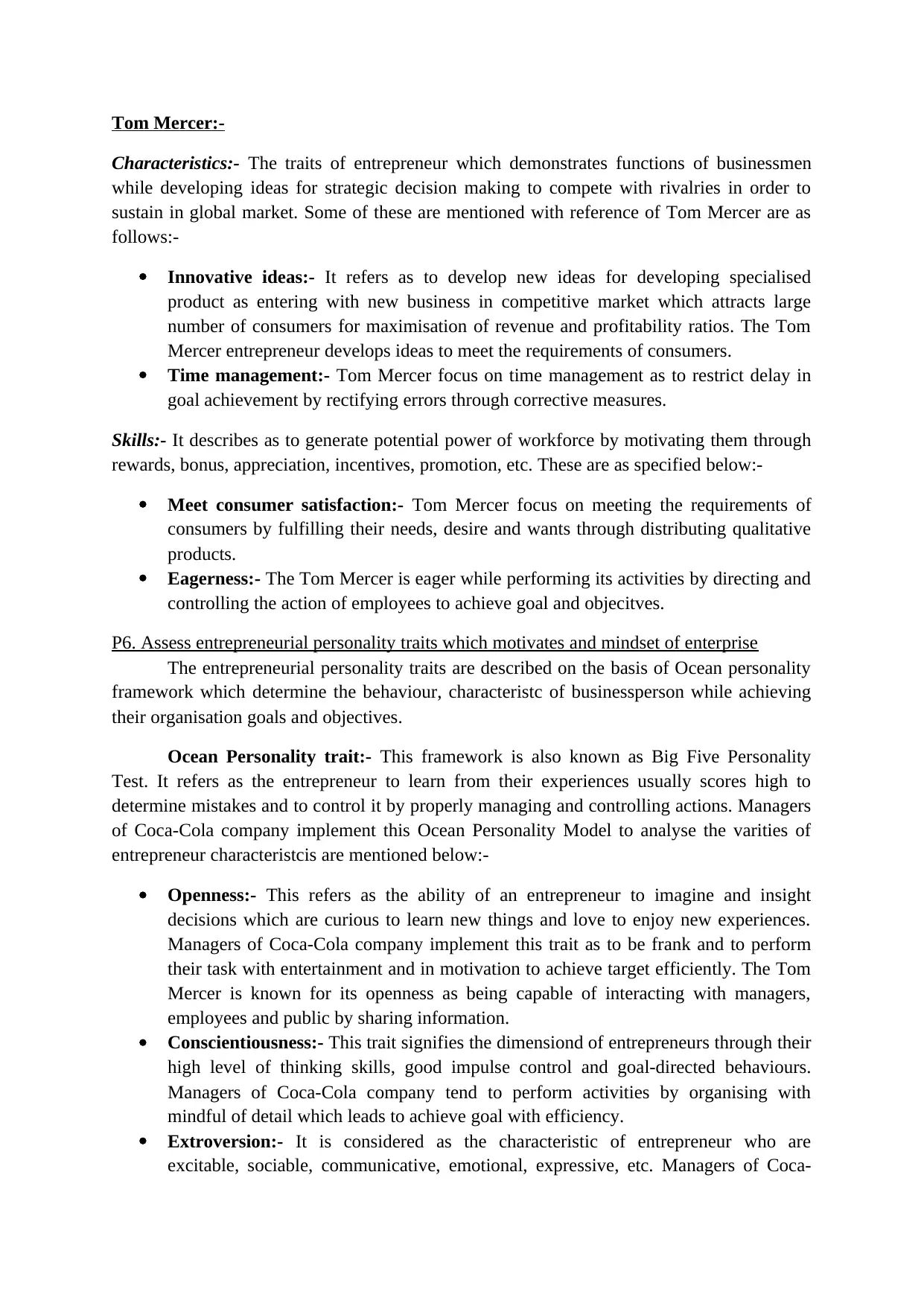
Tom Mercer:-
Characteristics:- The traits of entrepreneur which demonstrates functions of businessmen
while developing ideas for strategic decision making to compete with rivalries in order to
sustain in global market. Some of these are mentioned with reference of Tom Mercer are as
follows:-
Innovative ideas:- It refers as to develop new ideas for developing specialised
product as entering with new business in competitive market which attracts large
number of consumers for maximisation of revenue and profitability ratios. The Tom
Mercer entrepreneur develops ideas to meet the requirements of consumers.
Time management:- Tom Mercer focus on time management as to restrict delay in
goal achievement by rectifying errors through corrective measures.
Skills:- It describes as to generate potential power of workforce by motivating them through
rewards, bonus, appreciation, incentives, promotion, etc. These are as specified below:-
Meet consumer satisfaction:- Tom Mercer focus on meeting the requirements of
consumers by fulfilling their needs, desire and wants through distributing qualitative
products.
Eagerness:- The Tom Mercer is eager while performing its activities by directing and
controlling the action of employees to achieve goal and objecitves.
P6. Assess entrepreneurial personality traits which motivates and mindset of enterprise
The entrepreneurial personality traits are described on the basis of Ocean personality
framework which determine the behaviour, characteristc of businessperson while achieving
their organisation goals and objectives.
Ocean Personality trait:- This framework is also known as Big Five Personality
Test. It refers as the entrepreneur to learn from their experiences usually scores high to
determine mistakes and to control it by properly managing and controlling actions. Managers
of Coca-Cola company implement this Ocean Personality Model to analyse the varities of
entrepreneur characteristcis are mentioned below:-
Openness:- This refers as the ability of an entrepreneur to imagine and insight
decisions which are curious to learn new things and love to enjoy new experiences.
Managers of Coca-Cola company implement this trait as to be frank and to perform
their task with entertainment and in motivation to achieve target efficiently. The Tom
Mercer is known for its openness as being capable of interacting with managers,
employees and public by sharing information.
Conscientiousness:- This trait signifies the dimensiond of entrepreneurs through their
high level of thinking skills, good impulse control and goal-directed behaviours.
Managers of Coca-Cola company tend to perform activities by organising with
mindful of detail which leads to achieve goal with efficiency.
Extroversion:- It is considered as the characteristic of entrepreneur who are
excitable, sociable, communicative, emotional, expressive, etc. Managers of Coca-
Characteristics:- The traits of entrepreneur which demonstrates functions of businessmen
while developing ideas for strategic decision making to compete with rivalries in order to
sustain in global market. Some of these are mentioned with reference of Tom Mercer are as
follows:-
Innovative ideas:- It refers as to develop new ideas for developing specialised
product as entering with new business in competitive market which attracts large
number of consumers for maximisation of revenue and profitability ratios. The Tom
Mercer entrepreneur develops ideas to meet the requirements of consumers.
Time management:- Tom Mercer focus on time management as to restrict delay in
goal achievement by rectifying errors through corrective measures.
Skills:- It describes as to generate potential power of workforce by motivating them through
rewards, bonus, appreciation, incentives, promotion, etc. These are as specified below:-
Meet consumer satisfaction:- Tom Mercer focus on meeting the requirements of
consumers by fulfilling their needs, desire and wants through distributing qualitative
products.
Eagerness:- The Tom Mercer is eager while performing its activities by directing and
controlling the action of employees to achieve goal and objecitves.
P6. Assess entrepreneurial personality traits which motivates and mindset of enterprise
The entrepreneurial personality traits are described on the basis of Ocean personality
framework which determine the behaviour, characteristc of businessperson while achieving
their organisation goals and objectives.
Ocean Personality trait:- This framework is also known as Big Five Personality
Test. It refers as the entrepreneur to learn from their experiences usually scores high to
determine mistakes and to control it by properly managing and controlling actions. Managers
of Coca-Cola company implement this Ocean Personality Model to analyse the varities of
entrepreneur characteristcis are mentioned below:-
Openness:- This refers as the ability of an entrepreneur to imagine and insight
decisions which are curious to learn new things and love to enjoy new experiences.
Managers of Coca-Cola company implement this trait as to be frank and to perform
their task with entertainment and in motivation to achieve target efficiently. The Tom
Mercer is known for its openness as being capable of interacting with managers,
employees and public by sharing information.
Conscientiousness:- This trait signifies the dimensiond of entrepreneurs through their
high level of thinking skills, good impulse control and goal-directed behaviours.
Managers of Coca-Cola company tend to perform activities by organising with
mindful of detail which leads to achieve goal with efficiency.
Extroversion:- It is considered as the characteristic of entrepreneur who are
excitable, sociable, communicative, emotional, expressive, etc. Managers of Coca-
⊘ This is a preview!⊘
Do you want full access?
Subscribe today to unlock all pages.

Trusted by 1+ million students worldwide
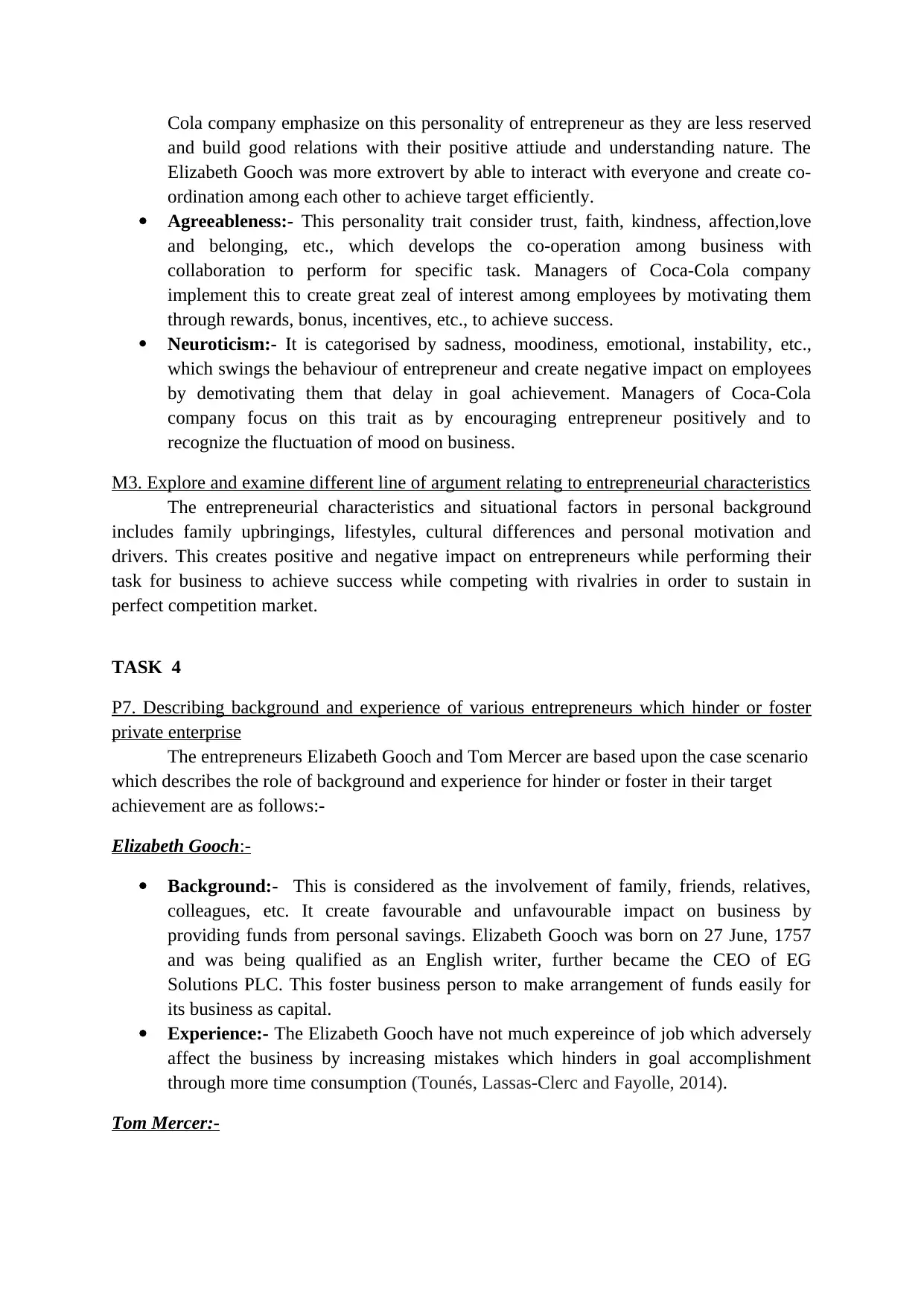
Cola company emphasize on this personality of entrepreneur as they are less reserved
and build good relations with their positive attiude and understanding nature. The
Elizabeth Gooch was more extrovert by able to interact with everyone and create co-
ordination among each other to achieve target efficiently.
Agreeableness:- This personality trait consider trust, faith, kindness, affection,love
and belonging, etc., which develops the co-operation among business with
collaboration to perform for specific task. Managers of Coca-Cola company
implement this to create great zeal of interest among employees by motivating them
through rewards, bonus, incentives, etc., to achieve success.
Neuroticism:- It is categorised by sadness, moodiness, emotional, instability, etc.,
which swings the behaviour of entrepreneur and create negative impact on employees
by demotivating them that delay in goal achievement. Managers of Coca-Cola
company focus on this trait as by encouraging entrepreneur positively and to
recognize the fluctuation of mood on business.
M3. Explore and examine different line of argument relating to entrepreneurial characteristics
The entrepreneurial characteristics and situational factors in personal background
includes family upbringings, lifestyles, cultural differences and personal motivation and
drivers. This creates positive and negative impact on entrepreneurs while performing their
task for business to achieve success while competing with rivalries in order to sustain in
perfect competition market.
TASK 4
P7. Describing background and experience of various entrepreneurs which hinder or foster
private enterprise
The entrepreneurs Elizabeth Gooch and Tom Mercer are based upon the case scenario
which describes the role of background and experience for hinder or foster in their target
achievement are as follows:-
Elizabeth Gooch:-
Background:- This is considered as the involvement of family, friends, relatives,
colleagues, etc. It create favourable and unfavourable impact on business by
providing funds from personal savings. Elizabeth Gooch was born on 27 June, 1757
and was being qualified as an English writer, further became the CEO of EG
Solutions PLC. This foster business person to make arrangement of funds easily for
its business as capital.
Experience:- The Elizabeth Gooch have not much expereince of job which adversely
affect the business by increasing mistakes which hinders in goal accomplishment
through more time consumption (Tounés, Lassas-Clerc and Fayolle, 2014).
Tom Mercer:-
and build good relations with their positive attiude and understanding nature. The
Elizabeth Gooch was more extrovert by able to interact with everyone and create co-
ordination among each other to achieve target efficiently.
Agreeableness:- This personality trait consider trust, faith, kindness, affection,love
and belonging, etc., which develops the co-operation among business with
collaboration to perform for specific task. Managers of Coca-Cola company
implement this to create great zeal of interest among employees by motivating them
through rewards, bonus, incentives, etc., to achieve success.
Neuroticism:- It is categorised by sadness, moodiness, emotional, instability, etc.,
which swings the behaviour of entrepreneur and create negative impact on employees
by demotivating them that delay in goal achievement. Managers of Coca-Cola
company focus on this trait as by encouraging entrepreneur positively and to
recognize the fluctuation of mood on business.
M3. Explore and examine different line of argument relating to entrepreneurial characteristics
The entrepreneurial characteristics and situational factors in personal background
includes family upbringings, lifestyles, cultural differences and personal motivation and
drivers. This creates positive and negative impact on entrepreneurs while performing their
task for business to achieve success while competing with rivalries in order to sustain in
perfect competition market.
TASK 4
P7. Describing background and experience of various entrepreneurs which hinder or foster
private enterprise
The entrepreneurs Elizabeth Gooch and Tom Mercer are based upon the case scenario
which describes the role of background and experience for hinder or foster in their target
achievement are as follows:-
Elizabeth Gooch:-
Background:- This is considered as the involvement of family, friends, relatives,
colleagues, etc. It create favourable and unfavourable impact on business by
providing funds from personal savings. Elizabeth Gooch was born on 27 June, 1757
and was being qualified as an English writer, further became the CEO of EG
Solutions PLC. This foster business person to make arrangement of funds easily for
its business as capital.
Experience:- The Elizabeth Gooch have not much expereince of job which adversely
affect the business by increasing mistakes which hinders in goal accomplishment
through more time consumption (Tounés, Lassas-Clerc and Fayolle, 2014).
Tom Mercer:-
Paraphrase This Document
Need a fresh take? Get an instant paraphrase of this document with our AI Paraphraser
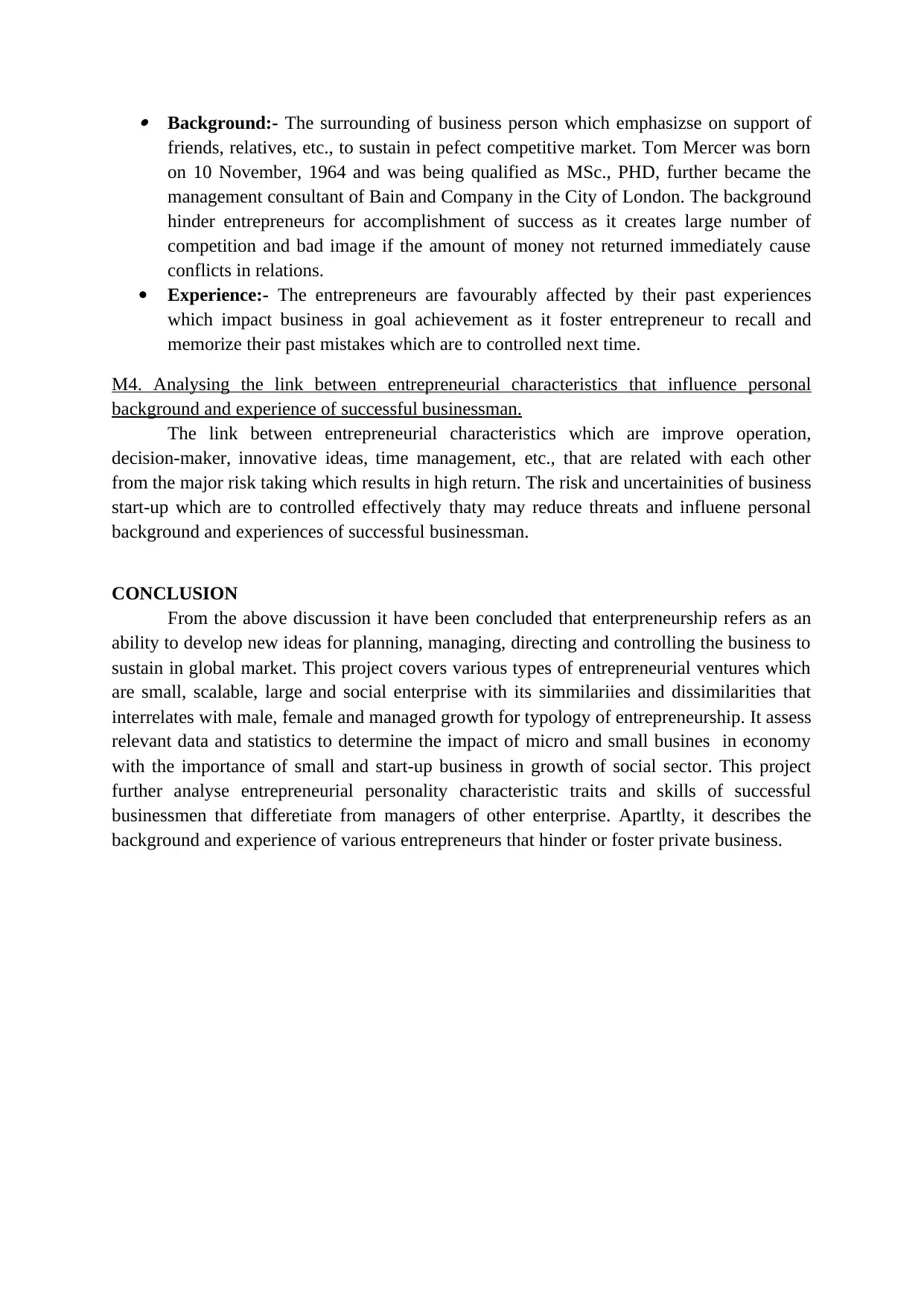
Background:- The surrounding of business person which emphasizse on support of
friends, relatives, etc., to sustain in pefect competitive market. Tom Mercer was born
on 10 November, 1964 and was being qualified as MSc., PHD, further became the
management consultant of Bain and Company in the City of London. The background
hinder entrepreneurs for accomplishment of success as it creates large number of
competition and bad image if the amount of money not returned immediately cause
conflicts in relations.
Experience:- The entrepreneurs are favourably affected by their past experiences
which impact business in goal achievement as it foster entrepreneur to recall and
memorize their past mistakes which are to controlled next time.
M4. Analysing the link between entrepreneurial characteristics that influence personal
background and experience of successful businessman.
The link between entrepreneurial characteristics which are improve operation,
decision-maker, innovative ideas, time management, etc., that are related with each other
from the major risk taking which results in high return. The risk and uncertainities of business
start-up which are to controlled effectively thaty may reduce threats and influene personal
background and experiences of successful businessman.
CONCLUSION
From the above discussion it have been concluded that enterpreneurship refers as an
ability to develop new ideas for planning, managing, directing and controlling the business to
sustain in global market. This project covers various types of entrepreneurial ventures which
are small, scalable, large and social enterprise with its simmilariies and dissimilarities that
interrelates with male, female and managed growth for typology of entrepreneurship. It assess
relevant data and statistics to determine the impact of micro and small busines in economy
with the importance of small and start-up business in growth of social sector. This project
further analyse entrepreneurial personality characteristic traits and skills of successful
businessmen that differetiate from managers of other enterprise. Apartlty, it describes the
background and experience of various entrepreneurs that hinder or foster private business.
friends, relatives, etc., to sustain in pefect competitive market. Tom Mercer was born
on 10 November, 1964 and was being qualified as MSc., PHD, further became the
management consultant of Bain and Company in the City of London. The background
hinder entrepreneurs for accomplishment of success as it creates large number of
competition and bad image if the amount of money not returned immediately cause
conflicts in relations.
Experience:- The entrepreneurs are favourably affected by their past experiences
which impact business in goal achievement as it foster entrepreneur to recall and
memorize their past mistakes which are to controlled next time.
M4. Analysing the link between entrepreneurial characteristics that influence personal
background and experience of successful businessman.
The link between entrepreneurial characteristics which are improve operation,
decision-maker, innovative ideas, time management, etc., that are related with each other
from the major risk taking which results in high return. The risk and uncertainities of business
start-up which are to controlled effectively thaty may reduce threats and influene personal
background and experiences of successful businessman.
CONCLUSION
From the above discussion it have been concluded that enterpreneurship refers as an
ability to develop new ideas for planning, managing, directing and controlling the business to
sustain in global market. This project covers various types of entrepreneurial ventures which
are small, scalable, large and social enterprise with its simmilariies and dissimilarities that
interrelates with male, female and managed growth for typology of entrepreneurship. It assess
relevant data and statistics to determine the impact of micro and small busines in economy
with the importance of small and start-up business in growth of social sector. This project
further analyse entrepreneurial personality characteristic traits and skills of successful
businessmen that differetiate from managers of other enterprise. Apartlty, it describes the
background and experience of various entrepreneurs that hinder or foster private business.
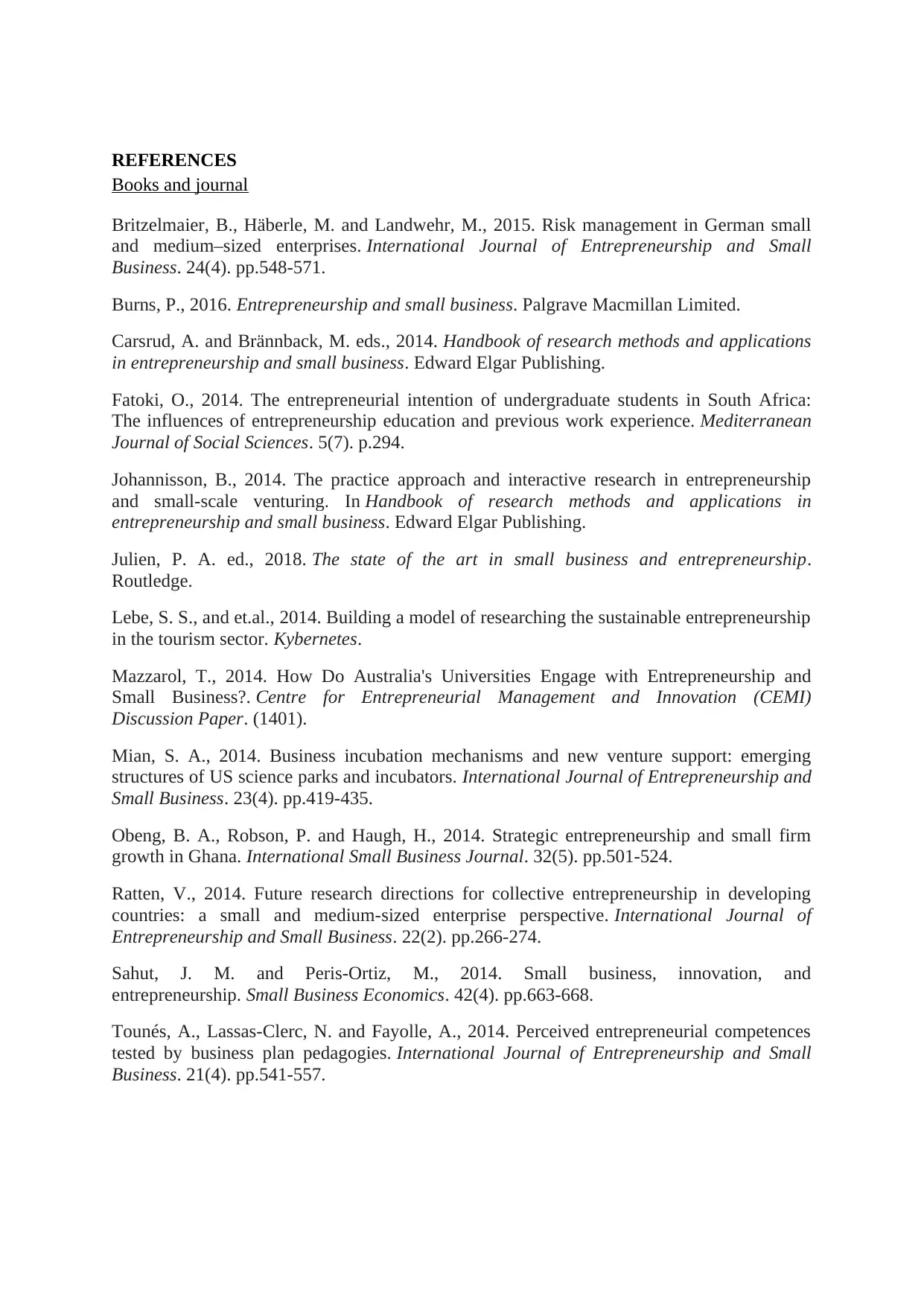
REFERENCES
Books and journal
Britzelmaier, B., Häberle, M. and Landwehr, M., 2015. Risk management in German small
and medium–sized enterprises. International Journal of Entrepreneurship and Small
Business. 24(4). pp.548-571.
Burns, P., 2016. Entrepreneurship and small business. Palgrave Macmillan Limited.
Carsrud, A. and Brännback, M. eds., 2014. Handbook of research methods and applications
in entrepreneurship and small business. Edward Elgar Publishing.
Fatoki, O., 2014. The entrepreneurial intention of undergraduate students in South Africa:
The influences of entrepreneurship education and previous work experience. Mediterranean
Journal of Social Sciences. 5(7). p.294.
Johannisson, B., 2014. The practice approach and interactive research in entrepreneurship
and small-scale venturing. In Handbook of research methods and applications in
entrepreneurship and small business. Edward Elgar Publishing.
Julien, P. A. ed., 2018. The state of the art in small business and entrepreneurship.
Routledge.
Lebe, S. S., and et.al., 2014. Building a model of researching the sustainable entrepreneurship
in the tourism sector. Kybernetes.
Mazzarol, T., 2014. How Do Australia's Universities Engage with Entrepreneurship and
Small Business?. Centre for Entrepreneurial Management and Innovation (CEMI)
Discussion Paper. (1401).
Mian, S. A., 2014. Business incubation mechanisms and new venture support: emerging
structures of US science parks and incubators. International Journal of Entrepreneurship and
Small Business. 23(4). pp.419-435.
Obeng, B. A., Robson, P. and Haugh, H., 2014. Strategic entrepreneurship and small firm
growth in Ghana. International Small Business Journal. 32(5). pp.501-524.
Ratten, V., 2014. Future research directions for collective entrepreneurship in developing
countries: a small and medium-sized enterprise perspective. International Journal of
Entrepreneurship and Small Business. 22(2). pp.266-274.
Sahut, J. M. and Peris-Ortiz, M., 2014. Small business, innovation, and
entrepreneurship. Small Business Economics. 42(4). pp.663-668.
Tounés, A., Lassas-Clerc, N. and Fayolle, A., 2014. Perceived entrepreneurial competences
tested by business plan pedagogies. International Journal of Entrepreneurship and Small
Business. 21(4). pp.541-557.
Books and journal
Britzelmaier, B., Häberle, M. and Landwehr, M., 2015. Risk management in German small
and medium–sized enterprises. International Journal of Entrepreneurship and Small
Business. 24(4). pp.548-571.
Burns, P., 2016. Entrepreneurship and small business. Palgrave Macmillan Limited.
Carsrud, A. and Brännback, M. eds., 2014. Handbook of research methods and applications
in entrepreneurship and small business. Edward Elgar Publishing.
Fatoki, O., 2014. The entrepreneurial intention of undergraduate students in South Africa:
The influences of entrepreneurship education and previous work experience. Mediterranean
Journal of Social Sciences. 5(7). p.294.
Johannisson, B., 2014. The practice approach and interactive research in entrepreneurship
and small-scale venturing. In Handbook of research methods and applications in
entrepreneurship and small business. Edward Elgar Publishing.
Julien, P. A. ed., 2018. The state of the art in small business and entrepreneurship.
Routledge.
Lebe, S. S., and et.al., 2014. Building a model of researching the sustainable entrepreneurship
in the tourism sector. Kybernetes.
Mazzarol, T., 2014. How Do Australia's Universities Engage with Entrepreneurship and
Small Business?. Centre for Entrepreneurial Management and Innovation (CEMI)
Discussion Paper. (1401).
Mian, S. A., 2014. Business incubation mechanisms and new venture support: emerging
structures of US science parks and incubators. International Journal of Entrepreneurship and
Small Business. 23(4). pp.419-435.
Obeng, B. A., Robson, P. and Haugh, H., 2014. Strategic entrepreneurship and small firm
growth in Ghana. International Small Business Journal. 32(5). pp.501-524.
Ratten, V., 2014. Future research directions for collective entrepreneurship in developing
countries: a small and medium-sized enterprise perspective. International Journal of
Entrepreneurship and Small Business. 22(2). pp.266-274.
Sahut, J. M. and Peris-Ortiz, M., 2014. Small business, innovation, and
entrepreneurship. Small Business Economics. 42(4). pp.663-668.
Tounés, A., Lassas-Clerc, N. and Fayolle, A., 2014. Perceived entrepreneurial competences
tested by business plan pedagogies. International Journal of Entrepreneurship and Small
Business. 21(4). pp.541-557.
⊘ This is a preview!⊘
Do you want full access?
Subscribe today to unlock all pages.

Trusted by 1+ million students worldwide
1 out of 12
Related Documents
Your All-in-One AI-Powered Toolkit for Academic Success.
+13062052269
info@desklib.com
Available 24*7 on WhatsApp / Email
![[object Object]](/_next/static/media/star-bottom.7253800d.svg)
Unlock your academic potential
Copyright © 2020–2026 A2Z Services. All Rights Reserved. Developed and managed by ZUCOL.




